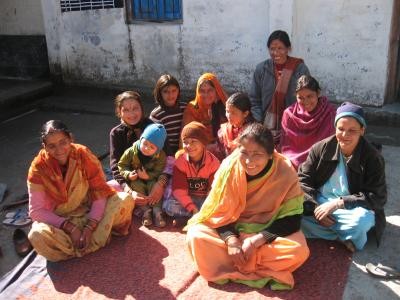Malnourished children are better fed when mothers have network of peers

Women in rural India who participate in a vocational training program learn more than just life skills. A recent University of Illinois study found that mothers who participated in a program designed to educate and empower women gained a network of peers that led to increased bargaining strength in the home, and significantly improved their children's consumption of rice and dairy.
"Prior to participating in Mahila Samakhya, which loosely translates to women of equal value, most of the participants reported regularly communicating with fewer than five women outside their families," said U of I economist Kathy Baylis. "Some of the women initially said things like, 'I never knew anybody like me could work outside of the home' and 'I never knew anyone like me could stand up to her husband.' But after participating in the program, even if they didn't go out and use that vocational training in jobs, they felt that they had a little more right to say, 'No, I think this is how we should be spending our money in our household.' Women were exerting more of a say over household resources," she said.
In India, over 40 percent of children under the age of five suffer from malnutrition. This is despite the fact that per capita income has more than doubled since the mid-1990s and agricultural production is at an all-time high, with large buffer stocks of cereals in government granaries.
"There's evidence that if women have more bargaining power in the household, particularly in developing countries where cash is very tight, quite often more resources go toward the kids," Baylis said. "So, to test that hypothesis, we went into homes with bowls and asked how many bowls this size of rice did your kids eat yesterday? Not only do we see evidence that more is going to kids, but more food is going to girls in particular, which is good because they tend to be the least powerful persons in the household. When times are tight, the girls' food is usually what's cut back," she said.
In the study, 487 women were surveyed from six of thirteen districts in Uttarakhand, four with the program and two without.
Baylis said that the study shows that women who are more empowered, educated, and mobile can actually change the village culture.
"Participants told us that before joining the program they couldn't work, had little contact outside the family, and had little say in the resources allocated to their children," Baylis said. "Their identity was always subsumed in their husband's, brother's, father's, or in-laws' identity. But after participating in Mahila Samakhya, women realized they have their own identity, that they can work if they want to, and that they can influence household and community decisions."
Baylis said that local men sometimes resist the program and prevent their wives from participating. As a result, initially only a few women may participate, but as others see the benefits, they muster up the courage to participate despite family opposition.
"In this area of India, domestic violence is a huge problem," Baylis said. "In a couple of the villages, we heard of support groups where women would go knock on doors and threaten to expose men if they didn't stop the violent behavior.
Baylis explained that the program is run through a branch of the Indian central government. A worker talks to people in the villages and gets a sense of where people might be receptive and finds out their interests, for example, if they'd like additional nutritional education or if there are particular job skills they would like to have.
"It's a very powerful program, but it is also very difficult to analyze because each program looks slightly different in each location. But the idea is the same - to bring together women in the village with some training and set up a support group," Baylis said.
This study is one of the first to study how peer networks affect female bargaining power and child welfare and one of the first evaluations of the Mahila Samakhya program since it began in 1995. The findings were shared with those who run the program to help them see what's working and what could be expanded.
Mar 10, 2014 04:36 PM EDT




